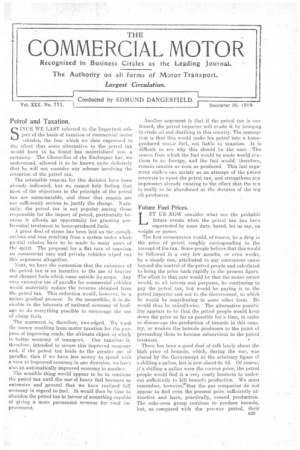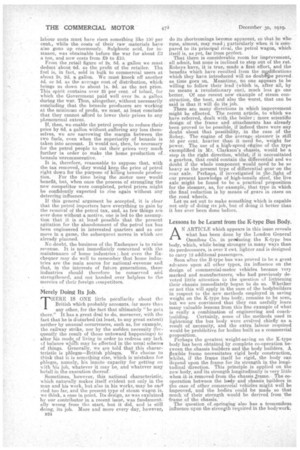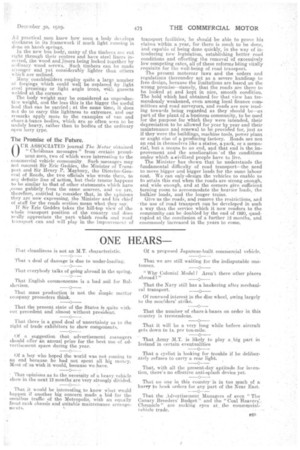COMMERCIAL MOTOR
Page 1

Page 2

Page 3

If you've noticed an error in this article please click here to report it so we can fix it.
Recognized in Business Circles as the Leading Journal.
The Authority on all forms of Motor Transport. Largest Circulation.
, Conducted by EDMUND DANGERF1ELD. Vol. XXX. N. 773, December 30, 1919.
Petrol and Taxation.
SINCE WE LAST referred to the important subject of the basis of taxation of commercial motor vehicles, the fear which we then expressed to the effect that some alternative to the petrol tax would have to be found has materialized iroo a certainty. The Chancellor of the Exchequer has, we understand, allowed it to be known quite definitely that he will not consider any scheme involving the retention of the petrol tax. The ostensible reasons for this decision have been 'already indicated, but we cannot help feeling that most of the objections to the principle of the petrol tax are surmountable, and those that remain are not sufficiently serious to justify the change_ Naturally, the petrol tax is not popular among those responsible for the import of petrol, particularly hecanse it affords an opportunity for granting preferential treatment to home-produced fuels. A great deal of stress -has been laid on the complications and cost resulting from a system under which partial rebates have to be made to many users of the spirit. The proposal for a flat rate of taxation on commercial cars and private vehicles wiped out this argument altogether. Next, we have the contention that the existence of the petrol tax is an incentive to the use of heavier and cheaper fuels which come outside its scope. Any very extensive use of paraffin for commercial vehicles would materially reduce the revenue obtained from the petrol tax. This reduction would, however, he a rather gradual process. In the meanwhile, it is desh able in the interests of national economy of haulage to do everything possible to encourage the use of cheap ft:els. The argument is, therefore, two-edged. We want the money resulting from motor taxation for the purpose of improving roads, the ultimate Object of which is better economy of transport. Our taxation is, therefore, intended to secure this improved economy and, if the petrol tax leads to the greater use of paraffin, then if we have less money to spend with a view to improved economy, in one direction, we have also an automatically improved economy in another. The sensible thing would appear to be to continue the petrol tax until the userof heavy fuel becomes so extensive and general that we have realized full economy in regard to fuel. It-would then be time to abandon the petrol tax in favour of something capableof giving a more permanent revenue for road improvements Another argument is that if the petrol tax is continued, the petrol importer will evade it by bringing in crude oil and distilling in this country. The assumption is that this would make his petrol into a homeproduced nioior fuel, not liable to taxation. It is difficult to see why this should be the case. The source from which the fuel would be made would continue to be foreign, and the fuel would, therefore, remain taxable as soon as produced. This last argument strikss one mainly as an attempt of the -petrol interests to upset the petrol tax, and strengthens any impression already existing to the effect that the t6 X is really to be abandoned at the dictates of the big oil producers.
FutureFuel Prices.. LET US NOW consider what are the probable future events when the petroltax has been superseded by some duty, based, let us say, on weight or power. The first consequence would, of course, be a drop in the price of petrol roughly corresponding to the amount of the tax. Some people believe that this would be followed in a very few months, or even weeks, by a steady rise, attributed to any convenient cause. beyond the control of the petrol people and calculated to bring the price back rapidlyto the present figure. The effect in that ease would be that the motor owner would, to all intents and purposes, be continuing to pay the petrol tax, but wouldbe paying • it to the petrol importer and not to the Government, to which he would be contributing -in some other form. He would thus be taieditwice. The alternative poisibi-' lity appears to be that the petrol people would keep down the price as far as possible for a time, in order to discourage the production of benzole in this country,or weaken the benzole producers to the point of persuading them to become subservient to the petrol . .. intefests. • There has been a good deal of talk lately about the high price of benzole, which, during the war, was placed by the Government at the arbitrary figure Of a shilling a gallon, but is now about 2s. 8d. Of course, if a shilling a gallon were the correct price, the petrol people would find it a very costly business to undercut sufficiently to kill benzoic, production. We must remember, howeverthat the gas companies do not appear to -find even the present price sufficiently atl tractive and have, practically, ceased prodUction. The coke-oven group continue to produce benzole, but, as compared with the pre-war period, their lab-our costs must have risen something like 150 per cent.,. while thee costs of their raw materials have also gone up enormously. Sulphuric acid, for instance, was obtainable before the war for about S.:3 a ton, and now costs from £9 to £10. From the _retail figure or 2s. Sd. a gallon we must deduct about 6d.. as the pro lit of the retailer. The fuel is, in fact, sold in bulk to commercial users at about 2s. 2d. a gallon. We must knock off another 44. or 5d. as' the average costof distribution, which' brings us clown to about is. 9d. as the net price. This spirit .contains over 25 per cent.. of toluol, for which the Government paid well over 3s. a gallon during the war. Thus, altogether, without necessarily concluding that the benzoic, producers are working at the minimum of profit, we must, at least conclude that they cannot afford to lower their prices to any phenomenal extent.
If, then, we enable the petrol people to reduce their price by 6d. a gallon without suffering any loss themselves, we are narrowing the margin between the two fuels, even when the superiority of benzoic is taken into account. It would not, then, be necessary for the petrol people to cut their prices very much further ia order to make the home production of , benzole unrernunerative.
It is, therefore, reasonable to suppose that, with the tax removed,. they would keep the price of petrol right down for the purpose of killing benzole production. • For the time being the motor user would benefit, but, when once the process of strangling the new competitor were completed, petrol prices might be confidently expected to rise again without any deterring influence.
If this general argument be aocepted, it is clear that the petrol importers have everything to gain by the removal of the petrol tax, and, as few things are ever done without a motive, One is led to the assumption that it is at least possible that the present agitation for. the abandonment of the petrol tax has been engineered in interested quarters and as one move in a game, the subsequent moves in which are already planned. No doubt, the business of the Exchequer is to raise revenue. It is not immediately concerned with the maintenance of home industries ; . but even the Exchequer may do well to remember that borne industries are the main source for national -revenue and that, in the interests of futtre generations, these industries should therefore be conserved and strengthened, and not handed over helpless to the mercies of their foreign competitors.
Merely Doing Its Job.
THERE IS ONE little peculiarity about the British which probably accounts. far more 'than any other, for the fact that ultimately " he gets there." It has a great deal to do, moreover, with the fact that he is disturbed (at least, to any .great extent) neither by unusual occurrences, such as, for example, the railway strike, nor by the sudden necessity (frequently the result of those untoward happenings) to alter his mode of living in order to redress any lack of balance labi'h may be effected in the usual schema of things. Generally, we are told that this characteristic is phlegm—British phlegm. We choose to think that it is something else, which is mistaken for phlegm, namely, his innate -capacity for getting on v.ith his job, whatever it may be, and whatever may befall in the exeoution thereat: Sometimes, 'however, this national characteristic, which naturally makes itself evident not only in the man and his work, but also in his works, 'may be eag Tied too far, and the present type of steam wagon is, we think, a case in point. Its design, as was explained by our contributor in a recent issue, was fundamentally wrong from the start, but it did. and is still doing, its job. More and more every day, however,
132-1 do its shortcomings become apparent, so that he who rims, almost, may read ; particularly when it ia compared to its principal rival, the petrol wagon, which itself is, as yet, far from perfect.
That there is considerable room for improvement, all admit, but none is inclined to step out of the rut. Robeys have, it is true, made a first effort, and the benefits which have resulted from the i r ilications which they have introduced will no daub e proved as time goes on. Meautime, no one appears to be willing to follow their lead (which is, after all, by no means a revolutionary one), much less go one better. Of one recent new example of steam conatruction, the best, and also the worst, that can be Said is that it will do its job. • There are many directions in which improvement might be effected. The recent article, to which we have referred, dealt with the boiler ; more scientific design of the frame and attachments has already been proved to be possible, if indeed there were any doubt about that possibility, in the case of the Robey. The engine of the average steamer is still 50 per cent, heavier than it need be, weight for power. The use of a high-speed engine of the type exemplified in Mr. CIarkson's chassis, would be a step in the right direction, whilst, if it necessitated a gearbox, that could oontain the differential and we doubt if the whole 'component would need to be so heavy as the present type of differential gear on the rear axle. Perhaps, if investigated in thealight of our present knowledge of high-tensile steel, the live axle might be found to be a practical proposition for the steamer, as, for example, that type in which the final reduction is by means of gears in cases on the road wheels. Let us set out to make something which is !capable not only of doing its job, but of doing it better than it has ever been done before.
Lessons to be Learnt from the K-type Bus Body.
A[NT ARTICLE which appears in this issue reveals what has been done by the London General Omnibus Co. in producing the K-type bus body, which, while being stronger in many ways than its predecessors, is over 2 cwt. lighter and is designed to carry 12 additonal passengers.
. Soon after the B-type bus was proved to be a great Advance upon all other types, its influence on the design of commercial-motor vehicles became very marked and manufacturers, who had previously devoted little attention to the question of lightening their chassis immediately began to do so. Whether or not this will apply in the case of the bodybuilders in respect to the new methods employed in saving weight on the K-type bus body, remains to be seen, but we are convinced that they can usefully learn many valuable lessons from this fine example of what is really a combination of engineering and coachauilding. Certainly, some of the methods used in lightening the bus body were evolved chiefly as a. result of necessity, and the extra labour required would be prohibitive for bodies built as a commercial proposition. Perhaps the greatest weight-saving on the K-type body has been obtained by complete co-operation between the, chassis builders and the body builders. A flexible frame necessitates rigid body construction, lwhilst, if the frame itself be rigid, the body can 'depend upon the frame for its strength in the longitudinal direction. This principle is applied on the new body, and its strength longitudinally is very little when it is removed from the chassis irame. The cooperation between the lastly and chassis bailders in the case of other commercial vehicles might well be improved, and the bodies could be made so that much of their strength would be derived from the frame of the chassis. • The question of apringing also has a tremendous influence upon the strength required in the bodywork: Ail practical men know how soon a body dc\ elops slackness in its framework if much light running is done on harsh springs. In the new bus body, many of the timbers are cut right through their centres and have steel liners inserted, the wood and sliners.being locked together by walinary wood screws. Such timbers can he made stronger and yet considerably lighter than others which are unlined.
' Many coachbuilders employ quite a largo number of forgings which could well, be ireplaeed by light steel pressings or light angle irons, with gussets welded at the corners. • The body weight may be considered as unproductire weight, and the less this is the bigger the useful load that can be carried; at the same time, it does not do to carry this lightness to extremes, and our remarks apply more to the examples of van and caarsea-bancs bodies, which are so often seen to be unduly heavy, rather than to bodies of the ordinary open lorry type.
The Promise of the Future.
OLTR ASSOCIATED journal The Motor obtained "a Chritainas messages" from • certain prominent men, two of which were interesting to the aommercial vehicle community. Such messages may not commit Sir Eric Geddes, the Minister of Trans. port and Sir Henry P. "Maybury, the Dire•otor-Genmail of Roads, the two officials who wrote them, to any definite line of action, but their tenour happens to be similar to that of other statements which have pane publicly from the same sources, and .xe are, therefore, entitled to 'consider that, in the apinions they are now expressing, the Minister and his chief of staff for the roads section mean what they say: If Sir Eric Geddes takes the hill-ton view of the whole transport position of the country and does really appreciate the part which roads and road transport can and will play in the• improvement of transport facilities, he should be able to prove his claims within a-year, for there is much to be done, and capable of being done quickly, in the way of introducing new legislation, establishing better road conditions and effecting the removal of excessively low competing rates, all of these reforms being vitally requisite for the well-being of road transport.
The present motorcar laws and the orders and regulations thereunder act as a. severe handicap to free design, because the limitations are based on the wrong premise—namely, that. the roads arc there to be looked at and kept in nice, smooth condition. The hold which had obtained for that view has tremendously weakened, even among local finance committees and road surveyors, and roads are now tending towards being regarded as they should be—as part of the plant of a business community, to beused for the puipose for which they were intended, their depreciation to be allowed for year by year and their maintenance and renewal to be provided for, just as if they were the buildings, machine tools, power plant or aught else of a 'producing factory. Roads axe not an end in themselves like a statue, a park, or a memorial, but a means to an end, and that end is the improvement and the amelioration of the conditions under which a, civilized people have to live. The Minister has shown that he understands the -fundamental difficulty of road transport--the need to move bigger and bigger loads for the same labour cost. We can only +design the vehicles to enable us to attain this end when the roads are strong enough, and wide enough, and at the corners give sufficient turning room to accommodate the heavier loads, the bulkier loads, and the longer trains. Give Us the roads, and remove the restrictions, and • the use of 'road transport can be developed in such a way that the service which it now renders to the community can be doubled by the end of 1920, quadrupled at the conclusion of a further 12 months, and enormously increased in the years to come.


























